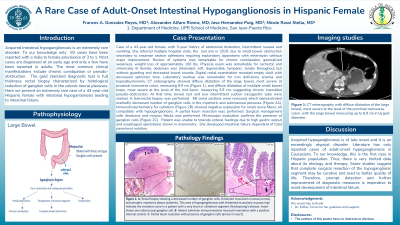Tuesday Poster Session
Category: Colon
P3122 - A Rare Case of Adult Onset Colonic Hypoganglionosis in Hispanic Female
Tuesday, October 24, 2023
10:30 AM - 4:00 PM PT
Location: Exhibit Hall

Has Audio

Frances Gonzalez Reyes, MD
University of Puerto Rico
San Juan, PR
Presenting Author(s)
Frances Ailis Gonzalez-Reyes, MD1, Alexander Alfaro, MD2, Steven Velez, MD1, Nicole Rassi-Stella, MD1
1University of Puerto Rico, San Juan, Puerto Rico; 2VA Caribbean Healthcare System, San Juan, Puerto Rico
Introduction: Adult onset colonic hypoganglionosis is an extremely rare disorder. To our knowledge only 92 cases have been reported with a male to female prevalence ratio of 3:1. Most cases are diagnosed early in life, and the primarily clinical manifestations include chronic constipation or pseudo-obstruction. The gold standard diagnostic test is full thickness rectal biopsy characterized by histological reduction of ganglion cells in the colonic neural plexuses. We present an extremely rare case of a 43 year old Hispanic female with adult onset colonic hypoganlionosis.
Case Description/Methods: 43 year old female, with a three-year history of abdominal distention, intermittent nausea, vomiting and multiple hospital visits, due to small bowel obstruction secondary to cesarean adhesions requiring exploratory laparotomy with enterolysis without major improvement. Review of systems was remarkable for chronic constipation and weight loss of approximately 90lbs. Physical exam was remarkable for cachectic and chronically ill female. Abdomen was distended but depressible, tympanic with decreased bowel sounds and tender throughout but without guarding. Digital rectal exam revealed empty rectal vault. Laboratory workup showed iron deficiency anemia and hypoalbuminemia. Abdominal enterography showed diffuse dilatation of the large bowel, most severe at proximal transverse colon (8.9cm) and diffuse dilatation of multiple small bowel loops, most severe at the level of the mid ileum (3.9 cm); suggesting chronic interstitial pseudo-obstruction. Bowel rest and low intermittent suction nasogastric tube were initiated at the time. The histopathology report of the full-thickness rectal biopsy confirmed the diagnosis of hypoganglionosis. Surgical management with ileostomy and mucous fistula was performed; pathology of the ileum showed presence ganglion cells. Patient was unable to tolerate enteral feedings due to high gastric output and esophageal aperistalsis. Furthermore, developed intestinal failure dependent of total parenteral nutrition.
Discussion: Literature has only reported cases of adult onset hypoganglionosis in Caucasians. To our knowledge, this is the first case in Hispanic population. Thus, there is very limited data about its etiology and therapy. Some studies suggest that complete surgical resection of the hypoganglionic segment may be curative and lead to better quality of life. Therefore, it is crucial to promptly detect and further enhance diagnostic measures to prevent the development of intestinal failure.

Disclosures:
Frances Ailis Gonzalez-Reyes, MD1, Alexander Alfaro, MD2, Steven Velez, MD1, Nicole Rassi-Stella, MD1. P3122 - A Rare Case of Adult Onset Colonic Hypoganglionosis in Hispanic Female, ACG 2023 Annual Scientific Meeting Abstracts. Vancouver, BC, Canada: American College of Gastroenterology.
1University of Puerto Rico, San Juan, Puerto Rico; 2VA Caribbean Healthcare System, San Juan, Puerto Rico
Introduction: Adult onset colonic hypoganglionosis is an extremely rare disorder. To our knowledge only 92 cases have been reported with a male to female prevalence ratio of 3:1. Most cases are diagnosed early in life, and the primarily clinical manifestations include chronic constipation or pseudo-obstruction. The gold standard diagnostic test is full thickness rectal biopsy characterized by histological reduction of ganglion cells in the colonic neural plexuses. We present an extremely rare case of a 43 year old Hispanic female with adult onset colonic hypoganlionosis.
Case Description/Methods: 43 year old female, with a three-year history of abdominal distention, intermittent nausea, vomiting and multiple hospital visits, due to small bowel obstruction secondary to cesarean adhesions requiring exploratory laparotomy with enterolysis without major improvement. Review of systems was remarkable for chronic constipation and weight loss of approximately 90lbs. Physical exam was remarkable for cachectic and chronically ill female. Abdomen was distended but depressible, tympanic with decreased bowel sounds and tender throughout but without guarding. Digital rectal exam revealed empty rectal vault. Laboratory workup showed iron deficiency anemia and hypoalbuminemia. Abdominal enterography showed diffuse dilatation of the large bowel, most severe at proximal transverse colon (8.9cm) and diffuse dilatation of multiple small bowel loops, most severe at the level of the mid ileum (3.9 cm); suggesting chronic interstitial pseudo-obstruction. Bowel rest and low intermittent suction nasogastric tube were initiated at the time. The histopathology report of the full-thickness rectal biopsy confirmed the diagnosis of hypoganglionosis. Surgical management with ileostomy and mucous fistula was performed; pathology of the ileum showed presence ganglion cells. Patient was unable to tolerate enteral feedings due to high gastric output and esophageal aperistalsis. Furthermore, developed intestinal failure dependent of total parenteral nutrition.
Discussion: Literature has only reported cases of adult onset hypoganglionosis in Caucasians. To our knowledge, this is the first case in Hispanic population. Thus, there is very limited data about its etiology and therapy. Some studies suggest that complete surgical resection of the hypoganglionic segment may be curative and lead to better quality of life. Therefore, it is crucial to promptly detect and further enhance diagnostic measures to prevent the development of intestinal failure.

Figure: Figure 1. CT enterography with diffuse dilatation of the large bowel, most severe at the level of the proximal transverse colon, with the large bowel measuring up to 8.9 cm in largest diameter.
Disclosures:
Frances Ailis Gonzalez-Reyes indicated no relevant financial relationships.
Alexander Alfaro indicated no relevant financial relationships.
Steven Velez indicated no relevant financial relationships.
Nicole Rassi-Stella indicated no relevant financial relationships.
Frances Ailis Gonzalez-Reyes, MD1, Alexander Alfaro, MD2, Steven Velez, MD1, Nicole Rassi-Stella, MD1. P3122 - A Rare Case of Adult Onset Colonic Hypoganglionosis in Hispanic Female, ACG 2023 Annual Scientific Meeting Abstracts. Vancouver, BC, Canada: American College of Gastroenterology.
